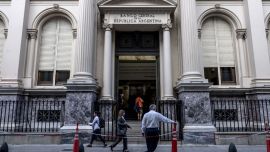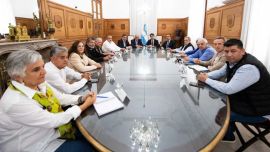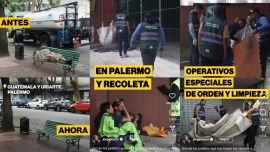About 150 people rallied at the Plaza de Mayo on Monday in the first significant protest against the lockdown imposed by the government to tackle the coronavirus pandemic.
Small groups of protesters joined up at the capital's famous square on the 25 de Mayo holiday to decry the extension of the quarantine period in Argentina, calling for citizens to be allowed to go back to work. Chanting and carrying banners, the demonstrators condemned the half of economic activity, a consequence of the lockdown that has been in force since March 20.
The protesters were united in their call for workplace and movement restrictions to be lifted, singing "We want to work." Others, more conspiratorial in their thinking, carried banners alleging that the pandemic was part of a plot to introduce the "new world order."
"I ask the government to let us work. We need to work because we cannot endure more days and months of no income. I do not receive [money through] social plans or bank loans," one demonstrator, Adrián Marazi, who works in construction, told the AFP news agency.
Another protester, Cecilia, a fashion entrepreneur, called for the government to support local industry more. She said she was angry that "the government goes out to buy face masks and coverings from outside [the country] when the textile industry stopped [working] 60 days ago."
"[My] factory's electricity bill continues to arrives and I continue to pay rent. We need to work," she added, stood in the historic Plaza de Mayo, before the Casa Rosda, on a key date in Argentina's history.
Another small demonstration also took place in Tigre, on the outskirts of the capital, with protesters hopping into their cars and driving in formation around the town.
Over the weekend, following a sharp rise in the number of infections, President Alberto Fernández ordered a two-week extension of the quarantine period. While restrictions in some provinces have been lifted, measures have been tightened in Buenos Aires City and the Conurbano, territory that accounts for around 90 percent of all Argentina's confirmed cases.
On Tuesday, Cabinet Chief Santiago Cafiero condemned the demonstration, saying the protesters had put others at risk.
"Yesterday [the protest on Monday] was not good. Let should express themselves differently, without putting themselves and others at risk, " said the official.
Cafiero, speaking to a local radio station, said the protest was "just in the City of Buenos Aires, where the greatest circulation of the virus is based."
The official said he understood the "anguish" many felt at being locked up but asked for all Argentines to "be careful" because "those situations put everyone at risk."
More than 12,600 cases have been recorded in Argentina since the start of the pandemic, with 467 deaths.
GDP is expected to contract by more than seven percent this year, according to the last Central Bank survey of economists. Argentina has been in recession since 2018, with rising poverty and runaway inflation. According to the INDEC national statistics bureau, economic activity fell by 11.5 percent in March compared to the same month the previous year. That data included just 10 days of the nationwide lockdown.
– TIMES/AFP





















Comments